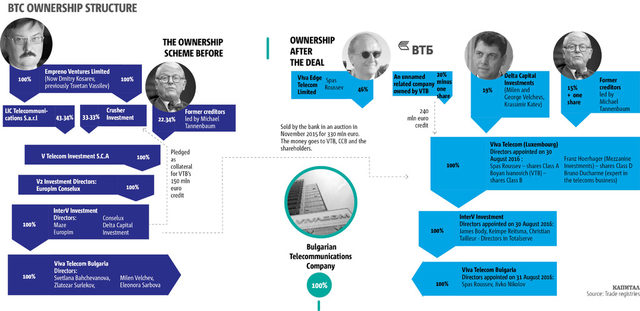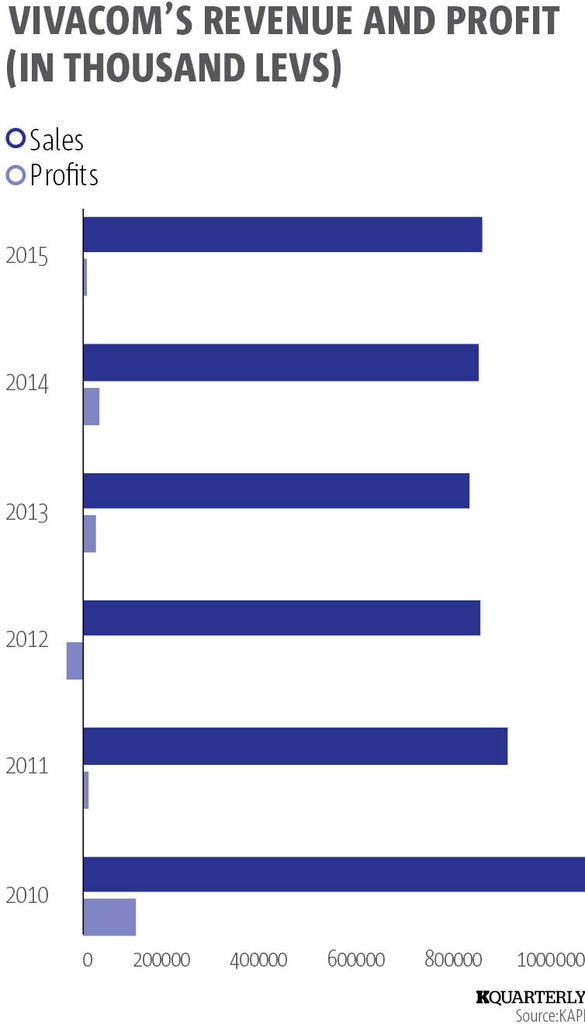Rumors of high level bribery, somewhat justified allegations of corporate raidership, murky middlemen and a fugitive banker are all intertwined in the takeover of the Bulgarian Telecommunications Company (BTC).
The Russian creditor of the biggest telecoms company in Bulgaria, Vneshtorgbank (VTB), sold it at the end of August 2016 following convoluted negotiations and legal actions that lasted more than a year. The new owner, Spas Roussev, is a politically well connected Bulgarian businessman active in the IT sector, real estate and hotel industry.
The change of BTC's ownership is the biggest business acquisition in Bulgaria in 2016. The company, operating under the brand name Vivacom, dominates the telecoms market with annual revenue of 442 mln. euro in 2015. But the deal is even more intriguing, because BTC was the crown jewel in the business and media empire of Tsvetan Vassilev, one of the main players in the shadowy political and business life in Bulgaria. Vassilev's Corporate Comercial Bank (CCB), which went bankrupt in 2014, was at the core of a complex and obscure network of companies, most of them acquired with the tacit assistance of his political friends. Now, the fight for the assets of Mr. Vassilev's empire points to re-distribution of power behind the curtains of the official political show.
BTC turned out to be a battlefield for competing Russian investors. To get their hands on the company, they seek local political support, exemplifying the Russian business penetration into the Bulgarian political system. The deal also shows how unattractive Bulgaria has become for strategic investors in sectors soaked with political intrigues.

VTB enters BTC
BTC, owned by a consortium of financial investors, ran into serious trouble serving its 1.7 billion euro debt back in 2010. After two years of negotiations, creditors, including the Royal Bank of Scotland and Deutsche Bank, approved the sale of the company in August 2012. The winning bidder was Viva Telecom Bulgaria, a wholly owned subsidiary of Luxembourg-registered InterV Investments. The biggest shareholder was Tsvetan Vassilev, followed by VTB and a group of BTC creditors. InterV Investments took a 150 mln euro loan from nine banks to finance its outstanding debt in November 2013 as part of the deal. The loan was later consolidated by VTB.
The VTB loan matured on 22 May 2015, at the time when Vassilev's CCB - Bulgaria's fourth-largest lender - had already gone bankrupt. The result of the payment default was another debt crisis for BTC. VTB decided to foreclose on the loan collateral - 100% of InterV Investment shares.
Hasty sale
The next stage came in November 2015. VTB held a hastily prepared auction in London which failed to attract many investors. In fact, there were only two - Spas Roussev, in partnership with VTB, and a consortium between Greek Olympia of the founder of Germanos retail chain, Panos Germanos, and the American hedge fund Third Point. Some investors like Mark Schneider, former Chief Executive Officer at Liberty Global Inc, together with US equity investment fund CVC, were, however, discouraged to show up, as there was no option to conduct due diligence and ensure enough transparency.
On 20 November 2015, Viva Telecom (Luxembourg) won the auction with a bid of 330 million euro. The consortium owners are Spas Roussev with 46%, VTB with 20% minus 1 vote and Delta Capital Investments, a company owned by former Bulgarian finance minister Milen Velchev, with 19%. The other shares went to smaller BTC creditors.
Cheap valuation
The auction raised a number of questions. VTB acted as both a seller and a buyer in the transaction. Not only did VTB and Delta, which without any doubt are related, hold the majority stake, but VTB also provided the bulk of financing to Spas Roussev through a 240 million euro credit facility for the buyer, Viva Telecom. In this arrangement VTB did not have the incentive to find the best offer, but rather to cut the company's price at the expense of the other existing shareholders and make a bigger profit later by reselling BTC one more time. Mr Roussev looks like the perfect cover for the real deal makers. He is very close to Milen Velchev, who is CEO of VTB's Bulgarian arm, VTB Capital AD. The rumor goes that actually Mr Roussev proposed Mr Velchev for finance minister back in 2001.

The speculation was partially confirmed by the fact that Schneider's indicative offer was considerably higher. He valued BTC at 830 mln euro, while Spas Roussev's bid valued it at 700 mln. euro, when factoring in the existing debt of the company.
Team Russia-2
The plot was tied even further when a new contender emerged - Dmitry Kosarev. The Russian businessman claims that his Empremo Ventures Ltd is the rightful holder of Vassilev's shares in BTC. Mr Kosarev, however, allegedly owns just one of InterV Investments' shareholders, while VTB sold InterV Investments as a whole. In doing so, Mr Kosarev claims, VTB had deprived him of his property. He announced that lawyers representing Empreno, had begun legal action in London against VTB Capital, the UK subsidiary of the Russian bank. He even filed a complaint before the US Office of Foreign Assets Control. Mr Kosarev claims, as Mr Vassilev did previously, that he had offered to re-finance the bank loan, but his offer was not even considered by VTB. The bank denies that Mr Kosarev delivered real evidence for his claims.
Russian Connections
Mr Kosarev has a questionable business history, including links to the Russian oligarch Konstantin Malofeev, which he fervently denies. Mr Malofeev was interested in the BTC acquisition, but was unable to take part in it because of the EU and US sanctions against Russia and Russian nationals implicated in supporting the pro-Moscow separatists in Ukraine. Mr Malofeev has never made a secret of his involvement in the Ukrainian conflict. Before Mr Kosarev appeared, there was another dubious investor who claimed BTC ownership - the Belgian Pierre Louvrier who had a long career in Russia and was probably also connected with Mr Malofeev.
The complex structure of the BTC ownership makes it very difficult to judge who really controls the shares of the last owner of the telecoms operator. It is quite possible that they were transferred by Mr Vassilev to Mr Malofeev's stooges in the hope that he can win over VTB. Mr Malofeev previously fought a seven-year battle against VTB that he finally won in a London court. Later, he settled his arguments with VTB in Russia as well. Russian newspaper Kommersant wrote in 2015 that the Russian bank significantly reduced its claims against Mr Malofeev due to his support for the pro-Russian separatist movement in Ukraine.
Who gets what?
VTB financed the whole operation with a 240 mln. euro loan, while consortium members came in with 100 mln euro of their own. The deal was made more expensive by the various fees, commissions and other transaction costs. With its participation VTB refinanced its non-performing loan to InterV Investment, which in the meantime had swelled to nearly 170 mln. euro. In practice, VTB came in with less than 100 mln euro, and was able to acquire a controlling position in the future resale of BTC.
The bulk of the money paid for BTC, 125 mln euro, will go to the receivers of the failed CCB. This is the funding the bank lent to Tsvetan Vassilev to acquire his stake in BTC in 2012, which is now blocked by the receivers. As a result, the shareholders of the telecoms operator will receive only 30-40 mln. euro in the best case scenario.
Rumors of corruption
The rapid approval of the deal by the Bulgarian regulators shows that it met the local political litmus test. This prompted Kosarev supporters to spread unsubstantiated rumors in the Russian press that Bulgarian Prime Minister Boyko Borissov was allegedly part of a corruption scheme.
This is probably not true. But the real test for the BTC deal significance for the shadowy forces of the Bulgarian business and political life is an event that happened a day before the final sale - Spas Roussev became owner of Sofia-based soccer club Levski. In previous years most of the soccer club owners in Bulgaria were arranged personally by Prime Minister Boyko Borissov.
The BTC deal definitely needed at least a nod from the government. The question is why then the government allowed such a procedure to take place at the expense of the state. The lower-than-expected price for BTC deprives the CCB receivers of tens of millions - money, which will ultimately come from the taxpayers who funded the repayment of the debt of the bankrupted bank.
Rumors of high level bribery, somewhat justified allegations of corporate raidership, murky middlemen and a fugitive banker are all intertwined in the takeover of the Bulgarian Telecommunications Company (BTC).
The Russian creditor of the biggest telecoms company in Bulgaria, Vneshtorgbank (VTB), sold it at the end of August 2016 following convoluted negotiations and legal actions that lasted more than a year. The new owner, Spas Roussev, is a politically well connected Bulgarian businessman active in the IT sector, real estate and hotel industry.












